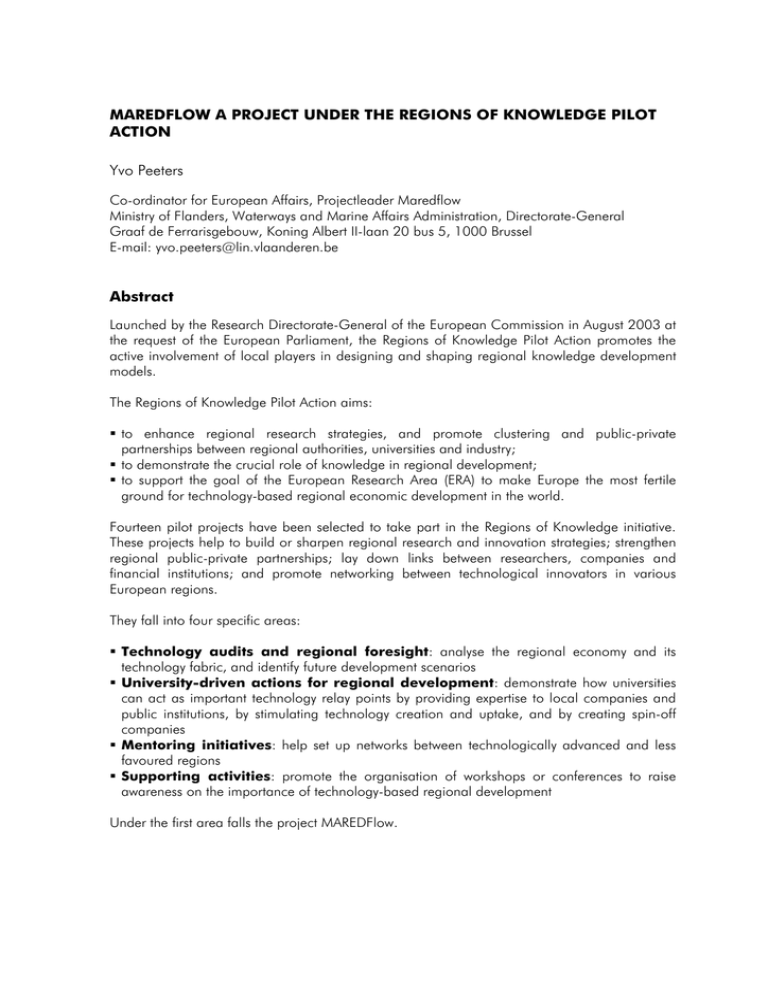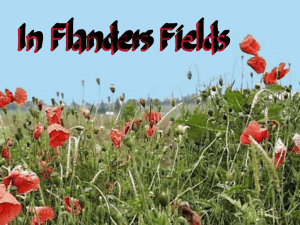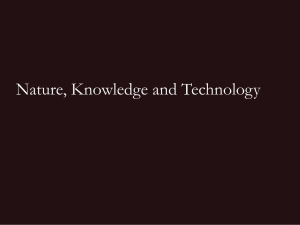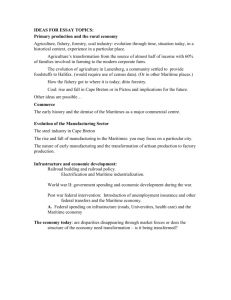MAREDFLOW A PROJECT UNDER THE REGIONS OF KNOWLEDGE PILOT ACTION Yvo Peeters
advertisement

MAREDFLOW A PROJECT UNDER THE REGIONS OF KNOWLEDGE PILOT ACTION Yvo Peeters Co-ordinator for European Affairs, Projectleader Maredflow Ministry of Flanders, Waterways and Marine Affairs Administration, Directorate-General Graaf de Ferrarisgebouw, Koning Albert II-laan 20 bus 5, 1000 Brussel E-mail: yvo.peeters@lin.vlaanderen.be Abstract Launched by the Research Directorate-General of the European Commission in August 2003 at the request of the European Parliament, the Regions of Knowledge Pilot Action promotes the active involvement of local players in designing and shaping regional knowledge development models. The Regions of Knowledge Pilot Action aims: to enhance regional research strategies, and promote clustering and public-private partnerships between regional authorities, universities and industry; to demonstrate the crucial role of knowledge in regional development; to support the goal of the European Research Area (ERA) to make Europe the most fertile ground for technology-based regional economic development in the world. Fourteen pilot projects have been selected to take part in the Regions of Knowledge initiative. These projects help to build or sharpen regional research and innovation strategies; strengthen regional public-private partnerships; lay down links between researchers, companies and financial institutions; and promote networking between technological innovators in various European regions. They fall into four specific areas: Technology audits and regional foresight: analyse the regional economy and its technology fabric, and identify future development scenarios University-driven actions for regional development: demonstrate how universities can act as important technology relay points by providing expertise to local companies and public institutions, by stimulating technology creation and uptake, and by creating spin-off companies Mentoring initiatives: help set up networks between technologically advanced and less favoured regions Supporting activities: promote the organisation of workshops or conferences to raise awareness on the importance of technology-based regional development Under the first area falls the project MAREDFlow. -1- Background The project partners cover diversified maritime regions (Flanders, Bremen, MecklenbrugVorpommeren, Pori and Asturias) which will benefit from the development of transport logistics linked tot the maritime transport. MAREDFlow wants to stimulate economic development in a number of maritime regions’ transport logistics sectors, by developing the knowledge-based economies of these maritime regions. The gains obtained from the implementation of the technologies and techniques – in logistical supply chains and port and commercial clusters – will be used to improve the overall regional economic performance. Implementation Knowledge development maps are developed and used to identify relevant technologies that provide economic gains and the paths which may be used for the effective transfer of information, expertise and experience from those able to deliver to those requiring it. The maps are interactive and aim to determine the need for actions such as technology transfer, training, benchmarking, mentoring and consultancy. These actions will subsequently be executed. Indication is also provided on complementary requirements such as financial support. Private sector companies as well as more conventional academic and public sector organisations are targeted. The knowledge development maps link organisations involved in the logistical supply chain within maritime regions: companies, ports, research institutes, higher education establishments and public authorities. Further, the maps allow those knowledge flows that will stimulate economic and trade development. Linked financial flows will also be identified by the maps, such as when the flow of knowledge involves the transfer of intellectual property or requires capital investment. Outcomes and benefits of the international co-operation Once a sufficient number of transfers has been made, an assessment of their impact in terms of improved regional economic performance can be undertaken. The results of this investigation will consolidate the project and new, incrementally improved, cycles of the system will be launched – providing a continuous, adaptive process. Measurement of the regional economic impacts will be made and published. The knowledge development mapping technique will remain able for use by the participating regions, and other regions, once the MAREDFlow project has been completed. The interconnection with IRC-network In developing its participation in MAREDFlow the Flemish partners have decided, upon proposal of the Flemish Institute for Innovation by Science and Technology, which is the IRC-manager in Flanders, to graft the ‘knowledge map’-principle of Maredflow upon the IRC-system. In this way a genuine practical implementation of the project was assured. The next speaker will dwell more extensively on this issue. To assure a diversified input and perspective on the Maritime Knowledge sector a steering group was formed, composed of representatives of the Antwerp Maritime Academy, Port of Antwerp, Flanders Public Employment Service, Universities of Brussels, Gent and Antwerpen, Flanders Marine Institute, Flanders Hydraulics Research, Institute for the Promotion of -2- Innovation by Science and Technology Flanders, Waterways and Canal Agency and Flanders Institute for Logistics. I want to thank the members of the SG for their valuable comments and contributions in these past two years. Finally I want to address the topic of today’s seminar. It is well known that Flanders is excelling in some maritime sectors such as dredging and maritime engineering, but in this seminar we also wanted to attract the attention to areas such as meteorology, digital mapping, safety devices, logistics, offshore wind energy, etc. In general I hope that this project will have induced more interest for the maritime world in its multiple aspects, and through the label of Flanders, Maritime Region of Knowledge the topic will be perpetuated and accentuated. -3-



